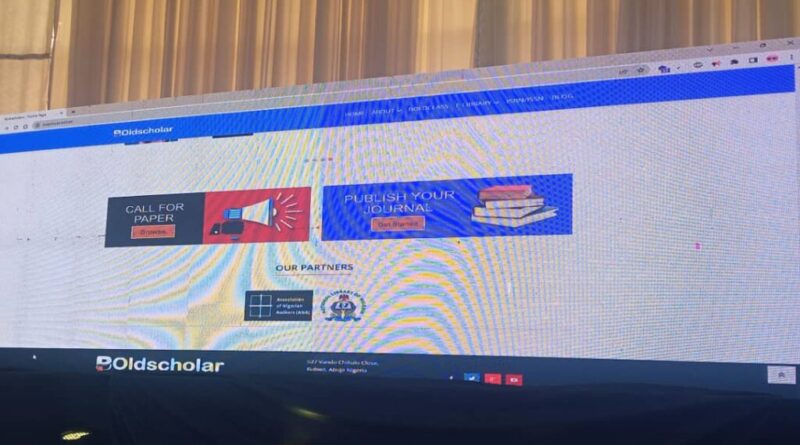National Library unveils database for authors’ online publications.
The ‘Boldscholar’ database was recently introduced by the National Library of Nigeria (NLN) to address the issue of pirated Nigerian literature.
At the launch of the artificial intelligence (AI)-driven e-library platform ‘Boldscholar’ in Abuja, the Chief Executive Officer of NLN, Prof. Chinwe Anunobi, claimed that the platform would break the jinx of writers and readers not having access to one another’s works.
According to Anunobi, the arrival of ICT necessitated a shift away from the conventional methods of storing materials and towards an electronic one.
She went on to say that this will benefit not only Nigerians who have access to digital materials but also authors and publishers.
She claims that Nigerians have a very high rate of literary output; for example, in only one year, we issued 17,000 ISBNs.
The National Library of Nigeria is responsible for archiving all information and materials produced by Nigerians, including those on this platform.
We’ve been doing it regularly in the old way, but since the rise of digital technology, it’s been a lot more work to compile all the national publications in one place.
“Initially, we didn’t have any choice but to require them to submit their resources in CD and flash, but we realised that those that were uploaded straight online were tough to enter into the memory of the country.
In June of 2022, Boldscholar approached us with a potential solution: they offered to help us create a databank for the national library to store all the digital resources that had been published up to that point.
Therefore, we agreed to sign the MoU and fully accept the idea. Because of this, everyone involved in the publishing industry in Nigeria, including authors and publishers, stands to benefit.
Users will be able to access them from the convenience of their own homes, which will increase their exposure. It’s a win-win situation, she argued, with financial benefits for both authors and publishers and greater exposure for published works.
Chukwuemeka Godswill, consultant and developer of Boldscholar, added that the platform would be of great use to Nigerians because the price of online reading will be set at just one thousand naira.
Godswill said that the service would reduce piracy while also providing authors with a means to monetize their creations.
He claimed that the website’s goal was to increase online visibility for works by Nigerian authors so that researchers could easily access them.
Its other goals include making e-learning easier to spread in Nigeria and beyond Africa by providing the digital tools needed for online studies and collecting journals from Nigerian universities so they can be seen around the world and have a bigger impact.
According to the authors, “it enables Nigerian tertiary institutions and authors to generate income (IGR) from their intellectual property (books and journals) through a system that makes them pay for each page that researcher’s access.”
He explained that they had found that many Nigerians wrote novels but that no one read them, so they had created this site to help get their works in front of readers in Nigeria and beyond.
In contrast to the past, where authors saw few readers even after publishing a book, Boldscholar allows authors to reach a global audience of billions.
He added that readers will be able to access literature written by Nigerian authors and that the platform will enable the national library to collect books published by Nigerians that have been collected from other nations.
Because of this, he explained, the platform was developed so that authors’ works could be translated into 40 languages, and he also mentioned that the platform would be accessible in two weeks.
Prof. Tahir Mamman, Nigeria’s Minister of Education, has said that keeping the writers’ works safe is important for the country’s economic and cultural development because of the role that literacy works have played in preserving Nigerian society’s culture.
Dr. Folake Olatunji-David, who is the Director of Basic Education for the Ministry of Education, noted that literature can reflect the rich cultural diversity of a country, offer solutions to problems, and strengthen communities.
He claimed that literature had contributed to the fight against corruption, for equal rights for women, and for social justice.
Writers in Nigeria play a key role in rallying people of all backgrounds to work together to create a brighter future. Therefore, writers play an indispensable part in modern culture.
Over the years, writers have liberated the minds of readers, stoked the fires of readers’ passion, and motivated readers to take action in pursuit of a unified national identity.
“Looking back, I think that our Nigerian writers, like professionals in other professions, have scored tremendous successes and should enjoy the respect, trust, and love of our country,” he remarked.
Mr. Camillus Ukah, President of the Association of Nigerian Authors (ANA), has made promoting literature in Nigerian classrooms and communities a top priority.
Ukah claimed it had collaborated with schools, libraries, and government organisations to inspire young people to read and write.
Amazing progress and major turning points have been witnessed by the organisation. We have collaborated relentlessly to raise awareness of and appreciation for Nigerian literature, to give a platform to the country’s many gifted authors, and to encourage the next generation of writers.
I’m really pleased with our group’s efforts since they’ve resulted in a setting that promotes innovation, discussion, and cross-cultural understanding.
A major accomplishment of ours has been the resurrection of the Mbari Series, a monthly debate series that serves as a forum for well-known authors.
“It has also been a forum where prospective writers may share ideas, gain insight from more experienced writers, network with peers, and establish bonds with teachers,” he said.
He stressed the importance of valuing creativity in shaping the country’s future and how it has helped young people find their voices, accept who they are, and add to Nigeria’s vibrant literary tapestry.




